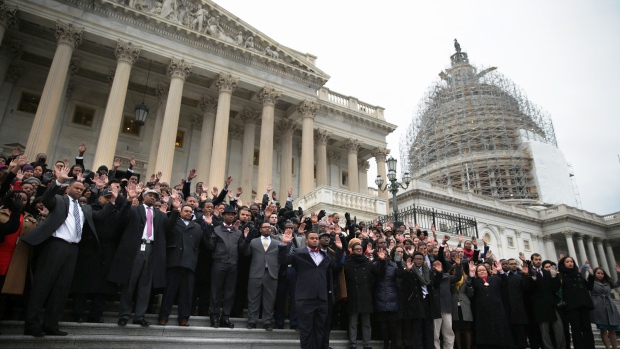During the past several weeks, protest marches have spread from Ferguson to Washington D.C.
Is it all about the police-involved deaths of two unarmed black men, or have these events uncovered a long simmering flaw in the criminal justice system – a system that appears to side with police and against the citizens they’re supposed to protect and serve?

John Zogby crunches numbers, a lot of numbers. His company, Zogby Analytics, is most visible during political campaigns months before an election. His purpose in analyzing all that data is not just to tell us who might win the next election. His work strives to help us better understand who we are now and where we are headed tomorrow.
In the commentary (Dec. 7) that follows, John explains why, in the cases of Eric Garner and Michael Brown, data numbers are not enough to understand what’s going on in the country.
The name of the company where I work together with my son is called Zogby Analytics and I am a great believer in capturing tons of statistical and behavioral information to find trend lines, areas where services can be improved and lives can be enhanced from an accurate reading of situations.
But data is only numbers and the left brain alone will never set us free. Ultimately we live in a world of other people who are multidimensional, very complicated, individual mosaics representing DNA combinations, parental nurturing, diverse peer relationships, strands of many cultural influences, a multiplicity of life experiences, observations, sources of information, and social networks. If you are old enough to remember the television series about crime in New York, The Naked City, you will certainly recall the show’s introduction – “There are eight million stories in the naked city.”
And this is where so many pundits, especially those who are ready to immediately defend the decisions of the grand juries in both Ferguson and Staten Island, miss the mark. Because these two events are about two very real victims who represent their community’s very real histories, sensibilities, and shared perspectives. They are two young and imperfect men who were community warehouses of painful memories. Try telling an abused child that the abuser has a history of pain or the priest or scout leader is really a man to be trusted. Try explaining that most adults are good people, that it hasn’t been all priests or other leaders. It is as futile as telling an African American child that the cop in the patrol car is his friend, is a benign servant of the community. That is not what the child knows, experiences, probably has seen for himself or herself, or hears. Thus it is not a matter of what statistics show. It is the community’s history, perceptions, emotions, and what a community’s leadership understands. It is a narrative that may or may not defy the statistics – but ultimately it is the story, not the stats that we all have to grasp.
So from the outset, as we learned of the Ferguson grand jury decision, we had former New York City Mayor Rudy Giuliani tell us that 93 percent of African American crime victims suffer at the hands of African Americans. The Mayor shined in many respects when he led the country’s largest city, but empathy with African Americans was never his strong suit. Or take this excerpt from a column by the Pittsburgh Post-Gazette’s Jack Kelly:
“Of 1,265 murder victims in St. Louis between 2003 and 2012, 1,138 (89.9 percent) were black, according to University of Missouri-St. Louis criminologist David Klinger, a former police officer.
“About 90 percent of the black decedents (1,025) were slain by other blacks, his research indicates. Thirty-two were killed by police officers, 22 (1.93 percent) by white cops.
“Between 1976 and 2011 across the United States, 7,982 blacks were murdered each year, on average – 94 percent by other blacks, according to the Bureau of Justice Statistics. About 227 blacks (2.8 percent) were shot by police each year, according to a study by Pro Publica (which pointed out that national statistics on police shootings are difficult to assess because of differences in how police departments report them).”
All respect to Mr. Kelly, who is a very good journalist, but what does this have to do with anything? Two young black men are dead (again) from two supposedly routine police operations.
The bean counting doesn’t really matter here. African Americans are outraged – so are a lot of non-African Americans, especially young people. The statistics don’t really tell us anything about perceptions developed out of a community’s pain. Statistics are always good to know, but relying only on numbers misses the point. Real analytics includes a sense of history, a lot of heart, and a large injection of right brain activity. I learned that from television as a kid: “There are eight million stories in the naked city.” And there are a lot more in African American communities throughout the United States.
Comments










